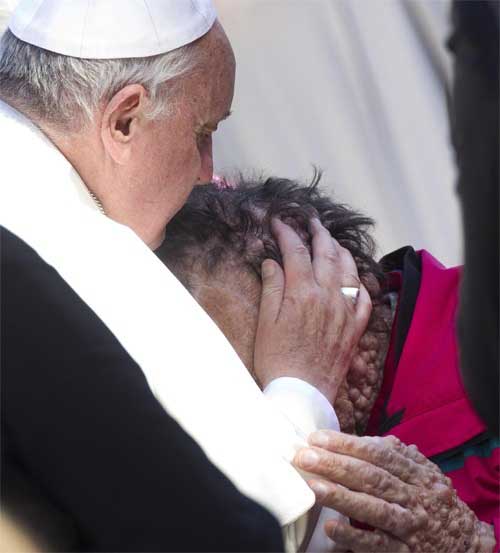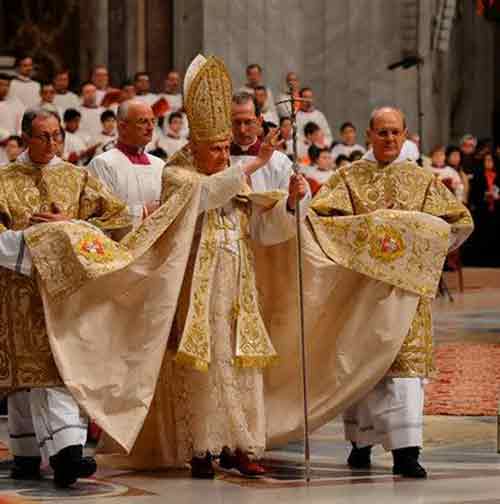Pope Francis issued an apostolic exhortation, Evangelii Gaudium, The joy of the Gospel.
I advocate that you read the actual text. In some ways this is articulating the shift in tone at the Vatican. His first encyclical, Lumen Fidei, was completing a text started by Pope Benedict XVI. This is his own.
This text has a missional approach. It is a (significant) shift in emphasis – those who think there will be a change in doctrine IMO are misunderstanding. Francis does not have time or energy to become distracted by (fine) debates over doctrine. [I would be (pleasantly) surprised if energy is put, as another example, into restoring a more contemporary English version of the Roman Catholic liturgy – but see below my point on the empowering of the episcopacy locally].
The focus is on the poor, the needy, the hurting, the last, and the least.
I prefer a Church which is bruised, hurting and dirty because it has been out on the streets, rather than a Church which is unhealthy from being confined and from clinging to its own security
I do not want a Church concerned with being at the center and then ends by being caught up in a web of obsessions and procedures.
In her ongoing discernment, the Church can also come to see that certain customs not directly connected to the heart of the Gospel, even some which have deep historical roots, are no longer properly understood and appreciated.
Some of these customs may be beautiful, but they no longer serve as means of communicating the Gospel. We should not be afraid to re-examine them. At the same time, the Church has rules or precepts which may have been quite effective in their time, but no longer have the same usefulness for directing and shaping people’s lives.
The Eucharist, although it is the fullness of sacramental life, is not a prize for the perfect but a powerful medicine and nourishment for the weak.
More than by fear of going astray, my hope is that we will be moved by the fear of remaining shut up within structures which give us a false sense of security, within rules which make us harsh judges, within habits which make us feel safe, while at our door people are starving.
The pope’s challenge is consonant with his Jesuit vocation, regularly expressed as “faith doing justice“.
Some are surprised at the pope’s approach to abortion. I am not.
Among the vulnerable for whom the Church wishes to care with particular love and concern are unborn children, the most defenceless and innocent among us… this defence of unborn life is closely linked to the defence of each and every other human right.
But, again, note pastoral emphasis:
the Church cannot be expected to change her position on this question. I want to be completely honest in this regard. This is not something subject to alleged reforms or “modernizations”. It is not “progressive” to try to resolve problems by eliminating a human life. On the other hand, it is also true that we have done little to adequately accompany women in very difficult situations, where abortion appears as a quick solution to their profound anguish, especially when the life developing within them is the result of rape or a situation of extreme poverty. Who can remain unmoved before such painful situations?
When it comes to women and ordination, again I think that Francis wants to put his energy, and the time he has in his papacy, elsewhere:
The reservation of the priesthood to males, as a sign of Christ the Spouse who gives himself in the Eucharist, is not a question open to discussion, but it can prove especially divisive if sacramental power is too closely identified with power in general. It must be remembered that when we speak of sacramental power “we are in the realm of function, not that of dignity or holiness”.
That door is not open. That it is not a question open to discussion does not lock the door to some future.
I am, again, not at all surprised that Pope Francis calls for greater decentralisation. It has long been a hope articulated at Vatican II, and a point I have expressed more than once on this site.
It is not advisable for the Pope to take the place of local Bishops in the discernment of every issue which arises in their territory. In this sense, I am conscious of the need to promote a sound “decentralization”.
Since I am called to put into practice what I ask of others, I too must think about a conversion of the papacy. It is my duty, as the Bishop of Rome, to be open to suggestions which can help make the exercise of my ministry more faithful to the meaning which Jesus Christ wished to give it and to the present needs of evangelization.
The papacy and the central structures of the universal Church also need to hear the call to pastoral conversion. The Second Vatican Council stated that, like the ancient patriarchal Churches, episcopal conferences are in a position “to contribute in many and fruitful ways to the concrete realization of the collegial spirit”. Yet this desire has not been fully realized, since a juridical status of episcopal conferences which would see them as subjects of specific attributions, including genuine doctrinal authority, has not yet been sufficiently elaborated. Excessive centralization, rather than proving helpful, complicates the Church’s life and her missionary outreach.
The Italian saying is, “After a fat pope, a lean pope”. Traditionalists, unsurprisingly, are reacting (tagline: “reading Francis through Benedict”) with comments like, “Half the time, when I review his daily sermons, I have a hard time figuring out what on earth he is talking about.” and “I have no problem joining with most of the rest of traditionalists in voicing my opinion that Francis’ election was a severe mistake that require decades, if not generations, to recover from.”
Pope Francis offers much more: a stress on the homily, on lectio divina,… Continue reading the text yourself. What is certain, during this papacy we shall no longer see this:





Many thanks for this interesting analysis, Bosco. You will easily guess that I feel a strong measure of sympathy for the disappointed Catholic traditionalists. (I really do get where they’re coming from, and for myself I would regret it if the expression of liturgical splendour exemplified in that second photo were to vanish always and everywhere.)
But it is chastening and healthful to be reminded that if we must choose between the Gospel and all our beautiful traditions, the choice should be easy. The traditions are intended to give delight in so far as they reflect our joy in the Gospel (Gaudium Evangelii!).
This put me in mind of a passage the first of F. D. Maurice’s sermons on the Prayer Book, where he warns against confusing the words and technicalities with its actual lived reality:
“The student in every profession must have his text-books; but if he merely repeats the phraseology of his textbooks instead of bringing it to bear on the common business of life, he is a pedant and no workman; he has not really mastered his craft. His professional knowledge is only good so far as it enables him to serve people who are not professional, but who are just as much interested in the realities of life as he is. The jargon of a Physician does not make him better able to cure sicknesses; he has been studying medicine that he may not be entangled with this jargon, that he may find his way through the confusions which the equivocal use of words, or the elaboration of theories has brought into the investigation of facts.”
In other words, a tiara does not make a pope!
And he goes on to say of worship in particular:
“I do not think we are to praise the Liturgy, but to use it. If we find that it has been next to the Bible our greatest helper and teacher, we shall shrink with modesty and piety of pupils from assuming towards it a tone of patronizing commendation. When we do not want it for our life, we may begin to talk of it as a beautiful composition: thanks be to God it does not remind us of its own merits when it is bidding us draw nigh to Him.”
The beauty of it, though, is that so often it depends simply on a change of perspective (as Pope Francis hints in his treatment of the all-male priesthood: not open for discussion, but ripe for re-interpretation, not in terms of dignity but in terms of function). We recently had an event celebrating the fiftieth anniversary of the death of C. S. Lewis, and I had occasion to point out that in The Pilgrim’s Regress the terrifying mountain castle of the Landlord east of Puritania turns out, in the end, to be one and the same as the beautiful Island in the west that the pilgrim John is trying to reach: he goes all the way round the world to arrive right where he started.
Finally, I will be very interested to see how this decentralization instinct plays out. (We Anglicans have been muddling our way through it for a good while.) If successfully achieved, I can well imagine that it would, among other things, open doors for more productive conversations between Rome and Constantinople (if not necessarily Moscow, or, still less, Mount Athos…).
Thanks, Jesse. Great quotes and ideas. Blessings.
Thanks for bringing this to our attention.
I have had a quick skim of the actual document. It is a significant and worthy document with a lot to say. One that is worthy of slow and careful study – not just by Catholics but by all Christians.
While he may be clear about his ‘non negotiables’ as you have rightly pointed out – he also has much wisdom to offer on how to move forward as a church and share the real joy of the gospel.
Unlike other church documents which leave you going “Huh?”, this one has already got me going “Aha!”.
Through his rejection of other kinds of families than the one he knew, he is unseeingly rejecting also the very family wherein Jesus was born and raised.
Decentralization? It’s as Leopold II granting “independence” to the Belgian Congo. Only abolishing Vatican I (and some other) councils will make things better.